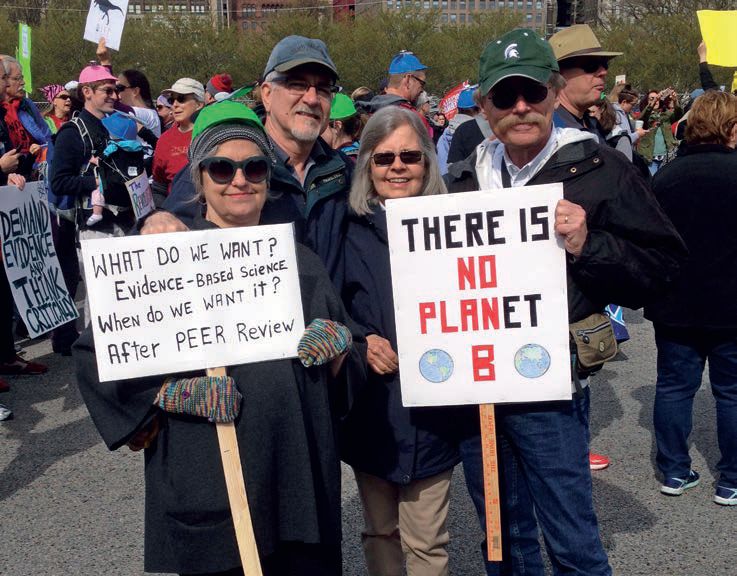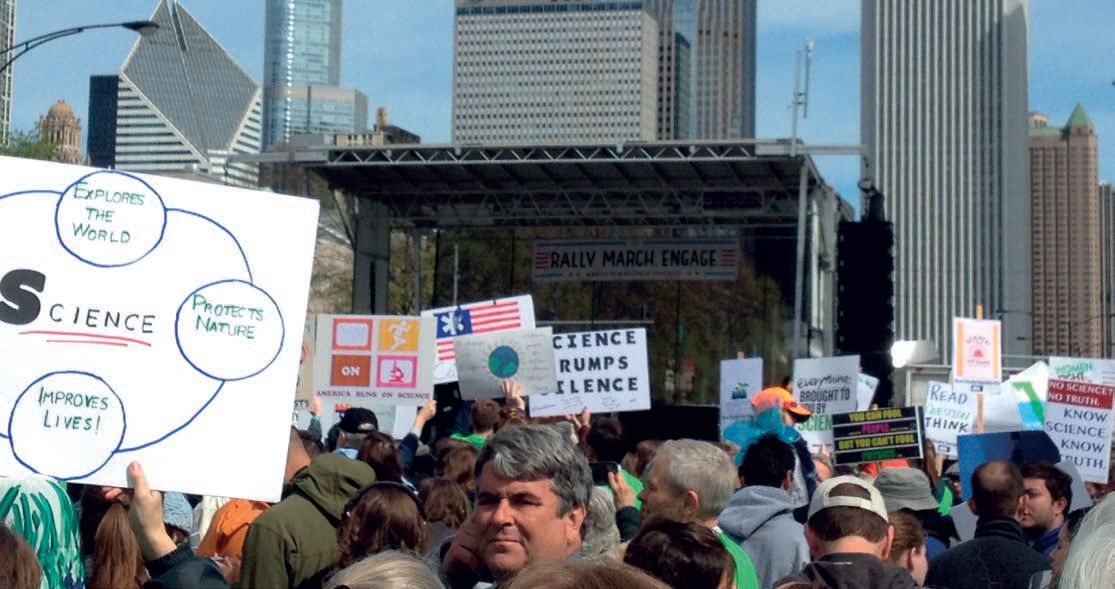
Physiology News Magazine
Belief, science and facts
News and Views
Belief, science and facts
News and Views
Mike Tipton
University of Portsmouth, UK
Mike White
University of Birmingham, UK
https://doi.org/10.36866/pn.107.14
A March for Science in response to the recent US election


‘Science is science and facts are facts’ appeared in a Donald Trump pre-election (2016) response to a science questionnaire distributed by Science Debate, a non-profit organisation that urges scientific literacy and accountability from political candidates. Fast forward to Saturday, 22 April 2017 when your correspondents were enjoying a post-breakfast stroll around the Grant Park area of Chicago contemplating the forthcoming board meeting of Experimental Physiology set for that afternoon. It was then that we joined a steady stream of people with banners and signs making their way towards the park for what was the pre-gathering of the March for Science. Soon we were joined by over 40,000 (some sources now state 60,000) people; in fact, numbers were so large that the police made media broadcasts to stop others attending
It was a diverse, buoyant crowd with some of the best posters we had ever seen. The initial speeches were given from a stage erected in the shadow of Trump Towers (a metaphor?).
It was deeply satisfying to see so many young children attending the rally. One 8th grader spoke passionately and confidently recited his essay titled, ‘Why I love Science’ to surely the biggest tutorial group ever assembled!
But we had one nagging worry, why in 2017, did we need a ‘March for Science’? Surely, we have come a long way since Copernican ideas were deemed heretical and Galileo was placed under house arrest? Surely, people value scientists and see science as the cornerstone of modern civilisation?
Well, apparently not. Increasingly, science is regarded by politicians as an inconvenience. Worse, increasingly scientists are being portrayed as alarmist, self-opinionated ‘boffins’ who live in a fantasy world. They are funded by government yet, it is claimed by some that they contribute too little to society.

It struck us how easy it has become for politicians and their publicity machines, to dismiss science as merely another form of personal opinion which can be sprinkled into TV ‘debates’ or denounced and occasionally supported in a short tweet, i.e. ‘science, bad!’ or ‘really clean coal’. And how easily rigorously gathered, peer-reviewed evidence can be dismissed as fake news because the implications of the evidence do not suit a political viewpoint. In short, the virus that is ‘spin’ appears to have infected science.

Ignorance of the scientific method is now sufficiently widespread to avoid immediate challenge to a preposterous statement. How boring to organise a debate only to find that all are in agreement, as the evidence is incontrovertible!
But who is at fault here and why have we regressed? Is it the work of politicians, their campaign teams and their marketing strategists, for attacking what they see as an inconvenient truth but one which they see is conveniently soft? Or are the scientists, technologists and engineers at fault for assuming that everyone knows what they do and how valuable it is to society, thereby producing that soft target.
Many of the banners at the recent march in Chicago illustrated, with great originality and humour, that perhaps the science community is waking up to the idea that we can no longer assume our efforts and their value are automatically understood. ‘Remember polio? I don’t. Thank a scientist’ read one poster.
If we allow the media to continue to use terms like ‘boffin’, when reporting any new discovery or technological advance, what picture does that conjure up in the minds of most people? We didn’t see any Dr Who lookalikes or Star Wars Stormtroopers at the rally; they were all at the nearby Comic-Con event, where belief in time travel and teleportation would be easy to find. In fact, our crowd looked remarkably normal and diverse.
Our collective memory of schoolboy science may be rose tinted (we are after all two men of a certain age) but it seemed back then that young people had a good idea where science and technology could lead and what it had contributed to society. Is it really the case that many people now do not see this connection and are put off science by the stereotypical portrayal of the mad scientist, the white coat and the laboratory?
The rally in Chicago and others that took place all around the world showed that there is a groundswell of opinion that supports science. We as scientists must keep up the pressure on our politicians to understand and support science and perhaps we all must do more to educate and inform people about the work we do and its importance to society. To ignore, disregard or belittle science is to disregard a way of acquiring knowledge. An approach that has been developed and tested over centuries, which people have fought for and are fighting for again. Science is a special method of findings things out; the bridge between belief and the truth. Importantly, science is also fun (some of the time!). We are not the ‘geeks’ that are portrayed in the media and we do have a life outside of science – some of us in rock bands! (GI Distress, a group composed of scientists including Kim Barrett, Editor-in-Chief of The Journal of Physiology, and Mark Frey, Senior editor of Experimental Physiology, played a gig at a pub in downtown Chicago).
Nearly 500 years after Galileo, we have to fight once more for science. So, whenever you get the chance and you catch someone using a device or marvelling at new technology remember to say ‘science did that!’
Time to boldly go… and engage?
